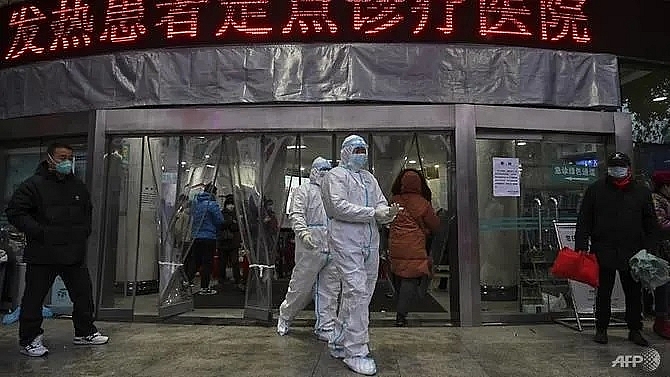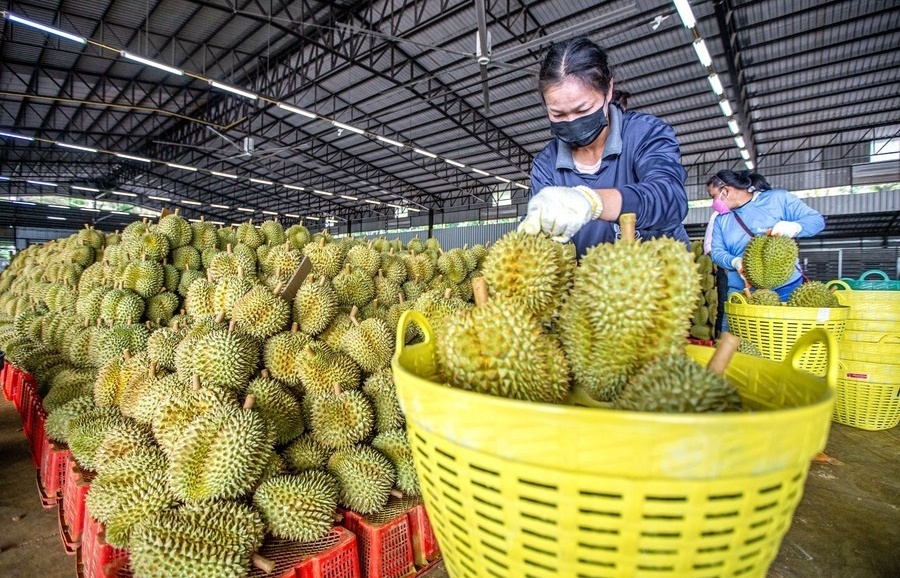Wuhan virus death toll surpasses 50 in China, more than 300 new cases
 |
| Medical staff members wearing protective clothing walk at the Wuhan Red Cross Hospital in Wuhan on Jan 25, 2020. (Photo: AFP/Hector Retamal) |
Fifteen more people have died and at least 688 new cases of the coronavirus have now been confirmed, according to the National Health Commission.
Among the new deaths, 13 were in Hubei, the province at the heart of the outbreak, while Shanghai reported its first death.
Chinese authorities have so far reported 1,975 cases nationwide.
President Xi Jinping warned on Saturday that China faced a "grave situation" as authorities raced to contain a respiratory illness that has caused the widespread abandonment of Chinese New Year celebrations nationwide and overwhelmed health facilities in Hubei.
The contagion remained centred on the Hubei provincial capital of Wuhan, which accounted for seven of the new deaths and 46 of the new confirmed cases, said the Hubei Health Commission.
Wuhan and more than a dozen other cities in the province have been locked down in a rapidly expanding quarantine effort marked by transport shutdowns and other restrictions on movement.
A second major Chinese city is set to halt long-distance buses as China scrambles to contain the deadly virus.
SUSPENSIONS, LOCKDOWNS
Starting Monday, Tianjin - a city of about 15 million inhabitants - will suspend long-distance buses and chartered buses that enter and leave the city, local officials said on their official Twitter-like Weibo account, a day after Beijing announced a similar measure.
China also announced a partial lockdown in the southern city of Shantou, the first such measure taken outside the epicentre of the disease.
From midnight, non-emergency vehicles will be prohibited from entering the city of 5.6 million people, which is a 1,100-kilometre drive from Wuhan, the heart of the epidemic.
People arriving at Shantou train stations will be screened and "urged to return", said city authorities.
Buses, ferries, public transport and taxis will be suspended, Shantou authorities said on their official social media account.
The measures are to "spare no efforts in doing a good job of preventing and controlling" the epidemic, Shantou officials said, and to "cut off the channels of spreading the virus".
The previously unknown virus has caused global concern because of its similarity to the SARS (Severe Acute Respiratory Syndrome) pathogen, which killed hundreds across mainland China and Hong Kong in 2002-2003.
It also has struck at possibly the worst time for China, when hundreds of millions of people are travelling across the country or overseas to celebrate the Chinese New Year holiday, China's most important festival.
FEAR IN WUHAN
Instead of New Year revelry, Wuhan has been seized by an eerie calm that deepened on Sunday as new restrictions banned most road traffic in the metropolis of 11 million.
Loudspeakers broke the silence by offering tips slathered with bravado.
"Do not believe in rumours. Do not spread rumours. If you feel unwell, go to the hospital in time," the message said.
"Wuhan is a city that dares to face difficulties and keeps overcoming them," the female voice added, mentioning the deadly 2002-03 SARS epidemic and 1998 Yangtze River flooding.
But some foreigners in Wuhan expressed deep concern, saying they feared going outside even though their food supplies were running low.
"The bustling city looks like a ghost town from my window. The shops are all shut down," Bangladeshi doctoral candidate Israt Zahan told AFP by phone.
"I am rationing the food at my home. It will last for two days, then I don't know what I will do."
Hundreds of military doctors have been sent to Hubei and authorities are rushing to build a pair of field hospitals to deal with the crisis as patients swamp local medical facilities.
The virus has spread nationwide in China and cases have been reported in several other countries as far away as the United States, France and Australia.
What the stars mean:
★ Poor ★ ★ Promising ★★★ Good ★★★★ Very good ★★★★★ Exceptional
 Tag:
Tag:
Themes: COVID-19
- 67 million children missed out on vaccines because of Covid: UNICEF
- Vietnam records 305 COVID-19 cases on October 30
- 671 new COVID-19 cases recorded on October 1
- Vietnam logs additional 2,287 COVID-19 cases on Sept. 21
- People’s support decisive to vaccination coverage expansion: official
Related Contents
Latest News
More News
- Thailand seeks to promote digital training (November 04, 2024 | 16:14)
- Indonesia attracts foreign investment in technology sector (November 04, 2024 | 16:08)
- Tropical storm Trami leaves at least 24 people dead in Philippines (October 24, 2024 | 17:36)
- Singapore grants conditional approval for solar power import from Australia (October 24, 2024 | 17:27)
- ASEAN digital economy set to reach $2 trillion by 2030 (October 22, 2024 | 15:08)
- Thailand asks Laos to waive visa fee at border checkpoints to boost tourism (October 21, 2024 | 17:23)
- Laos pledges to continue efforts to empower girls (October 21, 2024 | 17:17)
- Chinese electric vehicle maker to build plant in Indonesia (October 21, 2024 | 17:12)
- Vietnam Elevator Association introduces Elevator Safety Application to the world (October 18, 2024 | 09:00)
- A taste of the future - the go-to spot at the Worldchefs Congress & Expo 2024 (October 15, 2024 | 16:11)

























 Mobile Version
Mobile Version